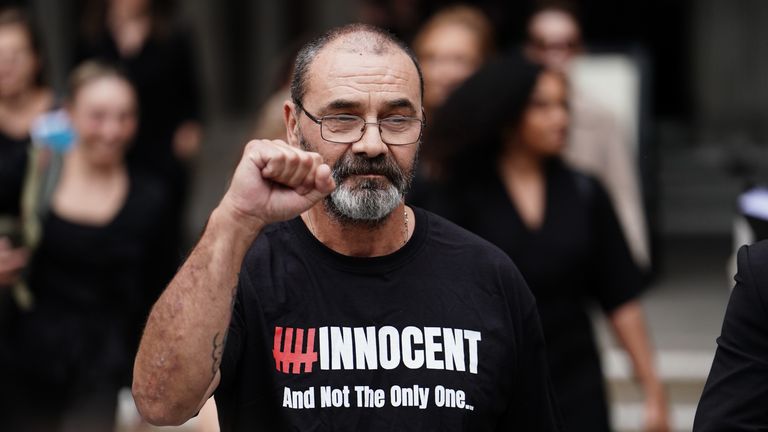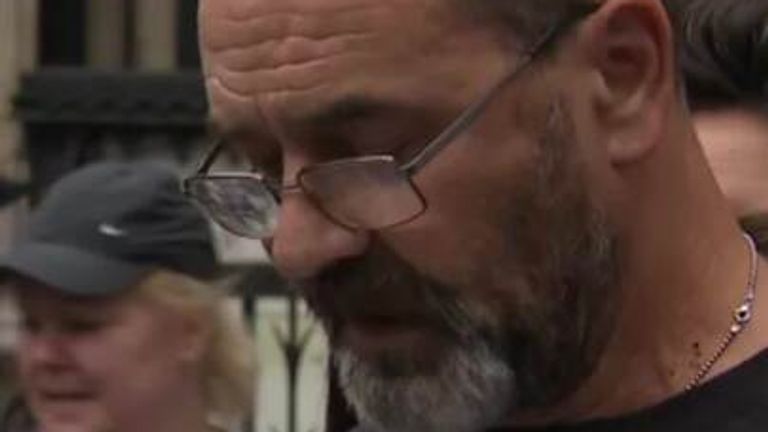
A man locked up for 17 years for a rape he did not commit has described a rule requiring him to cover living costs for his time spent in prison as “abhorrent” – as the UK’s justice minister agreed to scrap it.
Andrew Malkinson had his conviction quashed last month after fresh DNA evidence emerged linking another potential suspect to the crime.
But the 57-year-old was left “sickened” by the idea of paying for “board and lodging” from any compensation he obtains under the government’s miscarriage of justice scheme – which itself caps payments at £1m.
Justice Secretary Alex Chalk KC scrapped the rule with immediate effect on Sunday in the wake of Mr Malkinson’s case.
Speaking to Sky’s crime correspondent Martin Brunt, Mr Malkinson said: “I think it [the rule] is abhorrent.
“It is a very silly, very vindictive, actually. It is completely necessary.”
Mr Malkinson welcomed news it was being scrapped – and in a separate interview, he had said it was “the first of many changes we need in our justice system to protect the innocent”.
He also criticised the police’s initial investigation and his conviction by majority verdict – meaning not all 12 jurors agreed he was guilty.
“It took me 20 years to get justice because the miscarriage of justice watchdog does not investigate and is not accountable,” he said.
“It now may take me years to get any compensation because, even though my conviction has been overturned, the state now requires me to prove my innocence all over again.
“No one should have to suffer what I’ve been through. I hope Alex Chalk won’t stop here in bringing in the changes we need to make our justice system safer for the innocent, and more accountable for its mistakes.”
Read more:
Unfair for wrongfully convicted inmates to pay back prison costs, Rishi Sunak say
Previously, independent assessors could make deductions based on “saved living expenses” such as rent or mortgage payments, although this hasn’t happened over the past decade, according to the Ministry of Justice.
Mr Chalk has updated the guidance, which dates back to 2006, to remove the deductions from future payments made under the scheme.
He said: “Fairness is a core pillar of our justice system and it is not right that victims of devastating miscarriages of justice can have deductions made for saved living expenses.
“This common sense change will ensure victims do not face paying twice for crimes they did not commit.”
The maximum payment under the miscarriage of justice compensation scheme is £1m for more than 10 years’ imprisonment.
Mr Malkinson’s lawyer Emily Bolton, the director of charity law practice Appeal, said that the maximum award would equate to £58,824 per year he spent wrongly imprisoned – some £27,760 less than an MP’s basic £86,584 salary.
“The state robbed Andy of the best years of his life,” she said.
“Changing this one rule is not an adequate response. We need a complete overhaul of the appeals system, which took two decades to acknowledge this obvious miscarriage of justice.”
Mr Malkinson added: “It sounds, perhaps, to the average layperson like a lot of money. But that represents nearly two decades of living hell and lost opportunities, and lost love, and everything else that makes life precious.”
Sir Bob Neill, the Tory MP who chairs the Commons Justice Committee, said he was “delighted” that Mr Chalk had “moved so swiftly on this”.
“Big credit to Andrew Malkinson, his family and supporters,” he said.
Liberal Democrat justice spokesman Alistair Carmichael said the government must now review past cases “where people have been forced to pay for saved living expenses after being wrongfully convicted with the view to compensate these individuals fully.”
To be eligible for a payment under the scheme, someone must apply for compensation within two years of being pardoned or having their conviction reversed as a result of the discovery of a newly discovered fact, which demonstrates “beyond reasonable doubt” they did not commit the offence.













